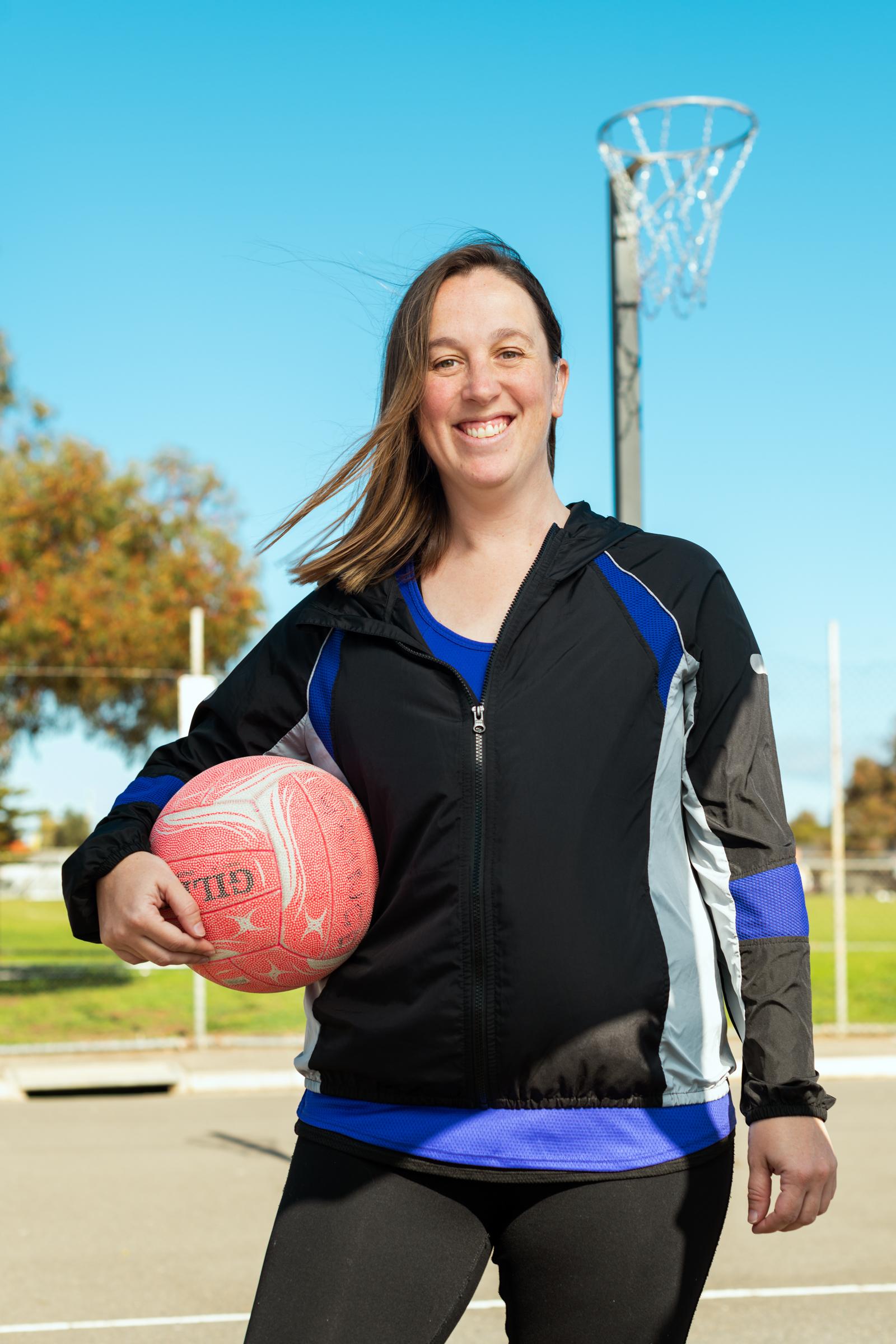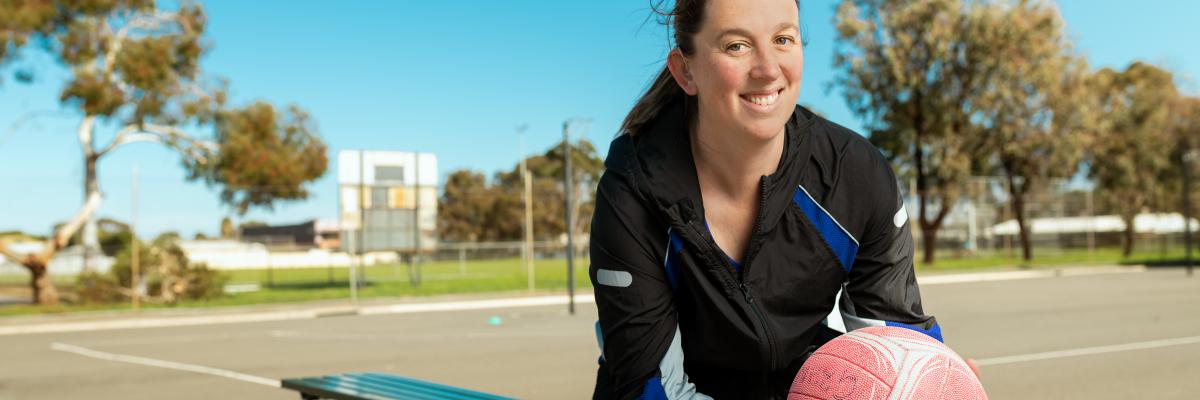Connected Conversations | Brooke Pearce
After being diagnosed as profoundly deaf 30 years ago, high-achiever, Dr Brooke Pearce became even more determined to strive for success. Following a strong career in research, Brooke is now the Senior Teaching Laboratory Support Officer for the faculty and aims to improve teaching for both students and staff at the University. On weekends, you may find her playing netball, coaching netball, or umpiring netball.

Please tell us a little bit about yourself.
My name is Brooke Pearce and I have recently been appointed as Senior Teaching Laboratory Support Officer for the Faculty of Health and Medical Sciences (a role I have been undertaking on secondment since early last year). I am responsible for leading an amazing team of professional staff in the delivery of high-quality and effective laboratory support services to courses in our faculty. I look after many of the teaching spaces in the Helen Mayo buildings, including the Vernon-Roberts Anatomy Museum, which I am very proud to have helped set up a few years ago.
I am passionate about ensuring that our students have an enjoyable learning experience, but also that our academic staff enjoy their teaching experience too. So, I work with our course coordinators to develop innovative ideas to improve the way we deliver our courses, make our laboratory sessions exciting and relevant, and to ensure they have all the materials required to meet their teaching goals. My efforts were recognised last year when I received a Special Commendation for COVID-19 Emergency Teaching Response, as well as the Executive Dean’s Award for Teaching Excellence (Professional Staff) at the 2020 Faculty Forum and Awards Celebration.
What has been your journey to get where you are today?
I have been at the University of Adelaide since 2000 — more than half my lifetime! I first started my long-term relationship with the University as a student, completing a Bachelor of Biomedical Sciences. Not knowing what to do next, I decided to go on and complete my honours and PhD, where I investigated ‘The effects of binge drinking and zinc treatment during pregnancy on long-term outcomes’. This sparked my interest in the area of ’early origins of adult diseases and I continued my research career in this area for several years as a postdoctoral researcher in the Discipline Obstetrics and Gynaecology.
At the end of my contract, I found myself switching career directions from research to learning and teaching support. While I loved the challenge of research and the skills I learnt during that time were invaluable, my passion and strengths were in helping support staff in the delivery of their classes. So, over the last ten years, I have worked my way up in various teaching laboratory support roles in the Faculty of Health and Medical Sciences to get to where I am now.
The biggest challenge along my journey was when I had to step up into my very first leadership role in the same week that the University shut down due to COVID-19 last year. Not only did I have to learn quickly to lead a team of brand-new staff, but the big challenge was that my team’s job is to support ‘face-to face’ classes, but we had no staff or students on campus! Nevertheless, I love a challenge and solving problems, so my lockdown period was spent supporting multiple courses in converting their classes into an online format. This included helping create more than 170 practicals and case-based learning sessions for students in physiology and medicine (Years 1-3) to complete from home. I was very busy!
What do you love most about working at the University of Adelaide?
I love working with my teaching support team. We are all very motivated individuals with different skills that all complement each other, so we make a great team. Over my 20 years at the University of Adelaide, I have developed some great relationships with many of the other support teams and academics in our faculty and I love working with people who are also passionate about their jobs and focused on enhancing the learning experience for students.
The best part of my job is that I am continuously learning new things. My study and research background is in physiology, but we support the laboratory needs of all the courses in the faculty (e.g. Physiology, Pharmacology, Anatomy and Pathology, Medicine, Nursing, Dentistry, Allied Health). So, it gives me the opportunity to develop my understanding in lots of different disciplines, learn new skills — like using virtual reality for teaching, learning online programs, and utilising new clinical tools — and I really enjoy helping teach the students too.
Where’s your favourite spot on campus?
My favourite spot on campus would have to be the Hub Central. I love chatting to my colleagues away from the office over lunch. I am a regular at Hawker’s Corner in the hub as they make the best Combination Laksa and Japanese Chicken Curry.

What inspired you to pursue a career in health?
Quite simply, I have always been very interested in learning about how the body works. I used to ask a lot of questions when I was young and, in high school, biology was my favourite subject. It was a logical progression to continue studying at University to learn more about physiology and different diseases of the human body.
Have you ever had a life-changing experience?
When I was in Year 2, I went to school as a perfectly normal kid, but came home with almost no hearing. I underwent many tests to determine the cause (one doctor even saying I was choosing not to listen!) but, with no medical explanation, I was diagnosed as being profoundly deaf.
I had to get hearing aids in both ears, learn to lipread, and went to speech therapy for many years to learn how to speak clearly again, as I couldn’t hear how I was pronouncing sounds. It was very difficult and stressful throughout primary school and high school but, being a high achiever, it just made me work so much harder and I would study for hours catching up on what I missed in class.
University was even more difficult with much larger classes, dark lecture theatres, and teachers often facing away when talking. I just kept studying hard, asking lots of questions, adapting to challenges (e.g. working in groups, lipreading through facemasks, question time at conferences, public speaking) and managed to excel throughout my education. It has definitely made me strive to take on challenges and my great work ethic has led me to where I am today. For someone who used to have anxiety talking to new people, I am both amazed and proud to now be in a position I love where I get to talk to many staff and students every single day.
What do you enjoy doing in your spare time outside of work?
Outside of work, my main passion is netball. In fact, if I came with a label it would say: ‘WARNING: May spontaneously start talking about netball’. I have been playing for over 30 years, am a life member of the Adelaide University Netball Club, and am now helping to run my local netball club, while coaching juniors and umpiring. I love it. I love watching my kids play sports, so my days are busy with netball, swimming, soccer, and long-days at the beach for life-saving training and carnivals.
What’s the motto that you live by?
‘It always seems impossible until it’s done.’
If anyone (including myself) has a problem they want to solve, I am always up for the challenge of finding a solution. There is nothing more satisfying than completing a task and being able to help someone with something they thought couldn’t be done.
What do you hope to achieve in the next 10 years?
With many changes happening in the faculty at the moment, I am very excited about working with the academic teams to help with the development of new courses. Over the next 10 years, I hope to continue supporting our faculty as part of the Teaching Laboratory Support Team, contribute new ideas for improving our laboratory classes, and help make our facilities exciting and innovative spaces for learning and teaching.
